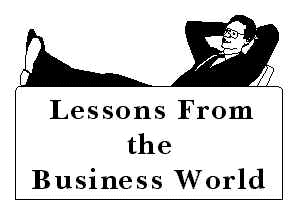F.U.N. News Issue #2

Failing To Succeed
By Billy Greer
Our society puts so much emphasis on winning that it leads to a lot of failure and
mediocrity. If at first this seems paradoxical, lets look at it a different way. If the
message is that winning and succeeding are good, then the unspoken corollary is that
losing and failing are bad. Unfortunately, when people concentrate on trying to avoid
failure rather than trying to succeed, problems arise. Just look at the following examples
to see how this can happen.
The difference between trying not to fail, and trying to succeed first became clear to
me in my younger years when I was in a wrestling tournament. My first opponent was someone
I thought was several weight classes above me. He looked twice as strong as me and I
couldn't believe we were the same weight. I was worried about losing before I stepped out
on the mat, but I made up my mind I was going to try my best not to lose to this guy. By
the end of the first period I was way behind, and my opponent had demonstrated that he was
more than strong enough to push me around at will. My coach warned me that I was trying so
hard not to lose, that I could never win the match. I realized he was right. In trying not
to lose, I was being very defensive and conservative. I was so afraid of making a mistake
that would cause me to lose that I was overlooking the mistakes my opponent was making. I
was already losing, so I was willing to take more risks in the next period. I ended up
pinning my opponent to win the match by using a move I had been afraid to try earlier.
Success and failure are not always as clear cut as in a wrestling match. Apparent
successes can actually be failures when risk is avoided. A small company that was
struggling financially was bought by a new company. It was rumored that the new owner
would have to lay off a few workers in order to return the company to profitability. The
only person who felt confident about retaining her job was Nora, in the Credit Department.
She had a perfect record. In 15 years of approving credit for clients, she had never had
any uncollected funds. She had a real knack for identifying clients who would be good
credit risks.
She was the first person to be laid off. The new owner recognized that Nora had the
wrong idea about the "risk" in managing credit risks. In an industry where the
norm was to have 1% of sales defaulted on, Nora was turning away a lot of potentially good
clients to maintain her perfect record. By loosening the requirements for credit, sales
could be increased enough to restore the company to profitability and more than make up
for a small percentage of uncollected bills.
Why do major innovations so rarely come from large companies that have more money for
research than small companies? Fear of failure. Univac pioneered the computer, but lost an
early lead to IBM. Univac's careful market analysis predicted that by the year 2000, only
about 1000 computers total would be in use. Why waste money on a product with no real
market? Fortunately, IBM didn't have the benefit of spending money on the same market
research and was willing to take a chance on computers. Unfortunately, by 1959 IBM was a
successful company less willing to take chances. That's when Haloid approached them for
help in completing and introducing a plain paper copier. IBM hired a consulting company to
do extensive financial and market analysis on the copier market. The study predicted that
only a total of 5,000 such machines could ever be sold, so IBM declined to get involved.
Within eight years, Haloid had changed its name to Xerox, and had sold almost 200,000
copiers.
In "Follow the Yellow Brick Road," by Richard Wurman, Jim Burke of Johnson
& Johnson is quoted recounting one of his own experiences with a failure.
- I once developed a new product that failed badly, and General Johnson called me in, and
I was sure he was going to fire me . . . Johnson said to me, I understand you lost over a
million dollars. And I said, Yes sir. That's correct. So he stood up and held out his
hand. He said, I just want to congratulate you. All business is making decisions, and if
you don't make decisions, you won't have any failures. The hardest job I have is getting
people to make decisions. If you make that same decision wrong again, I'll fire you. But I
hope you'll make a lot of others, and that you'll understand there are going to be more
failures than successes.
In another chapter, Wurman writes:
- Children are masters at spontaneous, incisive questions, and they use this effective
tool for acquiring information. However, somewhere along the way of growing up, this
inquisitiveness gets squashed—by parents, by teachers, by a growing
self-consciousness that prompts us to be wary of appearing uninformed.
Quality gurus exhort companies to empower their employees and to "drive out
fear." Taking away the stigma of failure encourages risk taking, and risk taking is
essential to improvement. Almost all major innovations and advancements involve going
against the conventional wisdom, facing the ridicule of the "experts," and
failing many times before finally succeeding.
 Why do
adults often have a more difficult time with computers than kids? Fear of failure. Adults
are afraid of breaking something. They are afraid of screwing up a program, or deleting
everything on the computer if they do something wrong. Worst of all, they are afraid of
admitting they know nothing about computers, or of not being able to do something that any
8 year old could do. Kids don't have those same fears. They usually don't realize they can
hurt anything, so they fearlessly experiment and quickly pick up the basics by trial and
error. If something doesn't work right the first time, they just try something different.
They expect to make mistakes when they try something they've never done before, and they
don't expect to be ridiculed for their mistakes.
Why do
adults often have a more difficult time with computers than kids? Fear of failure. Adults
are afraid of breaking something. They are afraid of screwing up a program, or deleting
everything on the computer if they do something wrong. Worst of all, they are afraid of
admitting they know nothing about computers, or of not being able to do something that any
8 year old could do. Kids don't have those same fears. They usually don't realize they can
hurt anything, so they fearlessly experiment and quickly pick up the basics by trial and
error. If something doesn't work right the first time, they just try something different.
They expect to make mistakes when they try something they've never done before, and they
don't expect to be ridiculed for their mistakes.
Allow your children to learn that failure is an acceptable consequence of trying
something new, that it can be an opportunity to learn, and that it is frequently a
steppingstone to eventual success. In a recent article by author Tom Peters, family
psychologist John Rosemond is quoted as writing that the "most effective parents are
those who are relaxed rather than constantly busy in their children's lives . . .. They
let their children make mistakes, realizing that the most valuable lessons in life are
learned through trial and error." It's not too late for you and your children to learn
to succeed by failing.
